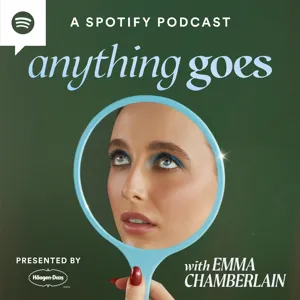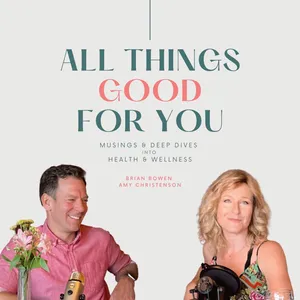Podcast Summary
Exploring the pros and cons of social media: Comedian Aparna Nancherla shares personal experiences with social media's advantages and disadvantages, while Cal Newport suggests living a fulfilling life without it. The debate continues on how to maintain a healthy relationship with these platforms.
Social media, while offering advantages such as increased visibility and opportunities for connection, can also bring about disadvantages like anxiety, depression, and a distraction from real-life relationships. Aparna Nancherla, a comedian who has built her career online, shares her personal experiences with these upsides and downsides. Cal Newport, an author and computer science professor, goes a step further and suggests that it's possible to live a fulfilling life without social media at all. Ultimately, the question is how to make the most of social media while avoiding its pitfalls. Is it possible to have a healthy relationship with these platforms, or should we consider eliminating them entirely? As the conversation continues, we'll explore these questions and more with Aparna Nancherla.
Balancing the Good and Bad of Social Media for Mental Health: Discover the importance of finding a balance between using social media for personal growth and mental well-being, while also recognizing its professional benefits.
Who Smarted podcast is not just for kids, but for the entire family. With episodes filled with fun facts, jokes, and educational content, it caters to people of all ages. Aparna Nincherla, a comedian based in New York, emphasized the importance of balancing the good and bad of social media for mental health. She shared her personal experience of reducing her social media use during quarantine for her own well-being. However, she acknowledged the role social media played in her professional life, particularly in promoting her work and expressing her point of view. Aparna admitted that she had to reevaluate her relationship with social media due to the intense environment and its impact on her mental health. Overall, the discussion highlighted the importance of finding a balance between the benefits and drawbacks of various forms of media and prioritizing mental health.
Twitter's impact on comedian's career: Twitter's immediacy and reach have transformed comedian's career, providing validation, accessibility, and a platform to connect with fans and discuss sensitive topics.
Social media, specifically Twitter, has significantly impacted the comedian's career by making their work more accessible and reaching a larger audience. The comedian joined Twitter in 2008, during its early popularity among comedians, and quickly discovered its potential for sharing short jokes. This immediate access to content and feedback can provide a sense of validation and existence that is not always present in everyday life. Additionally, the comedian's unique style of comedy may have been less accessible before the internet, as traditional methods of discovering stand-up comedy were limited. The internet has also allowed the comedian to connect with fans and discuss sensitive topics, such as mental health, in a more open and immediate way. Despite concerns about the potential harm caused by social media, the comedian continues to use it for career reasons and to reach a wider audience.
Social media: A blessing and a curse for mental health discussions: Social media can help people feel less alone in dealing with mental health issues but can also amplify and exaggerate those feelings. Finding a healthy balance is key.
Social media can be both a blessing and a curse when it comes to discussing mental health. On one hand, it can help people feel less alone and connect with others who are dealing with similar issues. On the other hand, it can amplify and exaggerate those feelings, making it harder for individuals to deal with them on their own. The speaker also expressed concerns about mental health becoming commodified as a trend on social media, which was not her original intention. She grappled with the idea of completely leaving social media behind versus finding a healthy balance. The speaker acknowledged the human impulse to start fresh but also recognized her tendency towards black and white thinking. Ultimately, she is still figuring out how to use social media in a healthy way to discuss mental health and connect with others.
Deep work leads to professional success: Deep work produces rare and valuable outcomes, while social media use can distract and hinder productivity. Focus on deep work for professional success.
According to Cal Newport, in today's economy, producing rare and valuable outcomes through deep work is key to professional success, while social media use, despite its perceived benefits, can be addictive and come with significant costs. Newport argues that activities requiring deep work, such as writing an elegant algorithm or a legal brief, are more valuable than using social media, which can distract and hinder productivity. However, it's important to note that social media tools are designed to be addictive, and the potential harms of their use must be weighed against any potential benefits before making a decision to use them. Ultimately, focusing on producing rare and valuable outcomes through deep work can lead to a meaningful and successful professional life, regardless of social media presence.
Balancing Social Media Use and Mental Health: Effectively using social media while protecting mental health requires finding a balance, setting personal limits, and being mindful of what works best.
While social media can be a powerful tool for building a career, particularly for underrepresented groups, it can also have negative effects on mental health. Aparna and Anshul discussed the challenges of quitting social media completely, especially in industries where it's expected to be constantly present. Aparna shared her personal strategy of limiting her social media use by not scrolling but only posting. She acknowledged the potential downside of this approach, but prioritized her mental health. Anshul added that the incentive to build an audience online and translate it into success in other mediums is still strong. They both agreed that finding a balance between using social media effectively and protecting one's mental health is crucial. Developing personal limits and being mindful of what works best is essential, but it can be a challenging process. There's no one-size-fits-all solution, and it may require trial and error or seeking professional help.
Strict social media boundaries aren't enough: Limiting social media use and finding supportive communities can help, but complete abstinence or prioritizing mental health may be more effective for personal growth and creativity.
Setting strict boundaries with social media use may not be as effective as completely abstaining from it. The speaker shares how they found that even limiting their use to specific times didn't fully prevent their brain from being negatively affected. They also emphasize the importance of finding a community of like-minded individuals in stand-up comedy, where kindness and thoughtfulness are valued. Additionally, they challenge the common perception that mental illness is a requirement for being a good artist or performer, stating instead that it can hinder creativity and the ability to put oneself out there. Overall, the speaker encourages finding what works best for personal growth and creativity, whether that be through limiting social media use, finding supportive communities, or prioritizing mental health.
Mental health and creativity connection: Maintaining mental health is crucial for creatives to avoid burnout and find balance between demands and creativity
Mental health and creativity are interconnected, but they do not cause each other. Having mental health issues can lead to over-analysis and introspection, which can be beneficial for comedy and art. However, it's essential to manage mental health to avoid burnout and maintain effectiveness as an artist. The struggle to set boundaries and cope with the demands of a large social media following is a common challenge for creatives, even those who have achieved significant success. It's important to remember that everyone's experience is unique, and what works for one person may not work for another. The ultimate goal should be to find a balance that allows for creativity while prioritizing mental well-being.
Social media's emotional rollercoaster: Find balance between personal expression and mental health on social media by creating funny content, understanding online audience, and setting boundaries.
Social media use can lead to a rollercoaster of emotions, from excitement and self-validation to self-loathing and comparison. The constant need for validation through likes and shares can create a cycle that makes it hard to appreciate successes and instead focuses on the next post. However, having a sense of humor and creating content that amuses oneself can help maintain a positive perspective. Practically, focusing on creating content that is personally funny can lead to successful tweets. Additionally, understanding the structures and phrasing that resonate with online audiences can increase the chances of a post doing well. Ultimately, it's essential to find a balance between using social media for personal expression and maintaining mental health by setting boundaries and focusing on the enjoyment of the process rather than the outcome.
Appreciating existence and local engagement: Balancing global connections with local engagement is crucial for a fulfilling life, and supporting local businesses and volunteering can help foster community relationships.
It's important to remember to appreciate existence and enjoy life beyond just producing and working. Aparna and Chris discussed the impact of Jocelyn Clyde's work on their perspective, emphasizing the need to reevaluate our relationship with society and our own communities. Aparna shared her personal efforts to be more present in her immediate surroundings and support local businesses and volunteering. The conversation underscored the importance of balancing global connections with local engagement. Additionally, the show is supported by Odoo, an affordable all-in-one management software, and Slack, where work happens in one place with integrated business applications and automation tools.






